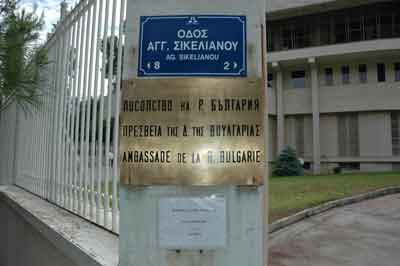
Marina Nikolova
Ekaterina Dimitrova is born in Sofia. She has graduated from the University of National and World Economy and is working in the Ministry of Labor and Social policy. Since August 2006, she is the head of the labor and social affairs office and is a counselor in the Greek embassy in Greece.
How does the Office for labor and social issues help Bulgarians in Greece?
Since there are many Bulgarians working in Greece, in 2006 the Ministry of Labor and Social Policy initiated the formation of an Office for labor and social issues in the Greek embassy in Sofia. Its main function is to assist and support the system coordination for social security between the two countries. Other issues the Social and Labor affairs office deals with includes assisting Bulgarians working in Greece by solving eventual labor and social problems when dealing with governmental and social organizations.
We consult people regarding different issues: which is the best way to solve a problem, which governmental or social organization it is best to address for help and support. Regarding more drastic situations, we inform and insist for the interference of the Ministry of Labor and Social Security, Ministry of Internal Affairs, the government administration and decentralization, syndicates or social organizations for foreigner protection.
In our work we pay great attention to voicing and explication of Bulgarians rights and obligations in the field of labor and social issues in the Greek and the Bulgarian legislation. Five Bulgarian newspapers, publishing articles on this topic, are being printed in Greece. We assist them by providing updated information and we also take part in the Bulgarian broadcast on the Athens radio.
Because some of our older countrymen started returning to Bulgaria we put effort in announcing the rights and procedures for receiving “European pension.” We also distributed brochures from the Bulgarian Ministry of Labor and Social Politics about “Facing the challenges of the labor European strategy,” “How to work and live in the EU after 2007,” “Working in Europe,” and left them in consulate offices, Bulgarian associations and institutions in Greece.
Periodically we organize meetings for Bulgarians not only in Athens but also in other parts of the country. Our last meetings were held in the three big cities on Crete, where around 20 000 Bulgarians reside and also on Rhodes – 5000 people.
How does the global financial crisis affect the Greek labor market and how can it affect the Bulgarians working here?
I believe that some of the first symptoms started in Greece. Data shows that until now the construction market has dropped with 19.2%. It is becoming harder and harder to find a job in this sector and consequently the salaries are decreasing too. Forecasts show that the crisis will mostly affect tourism and a big part of Bulgarians work in this sector. If the tourist flow decreases, inevitably some people will be left without a job.
Big part of women work as housekeepers. I do believe that if the crisis leaves some Greeks without a job, they will be able to look after their children or older parents and they won’t need to pay a woman for that job.
The Ministry of Labor and Social Policy started an initiative, which aims for connection Bulgarian employers with Bulgarian employees abroad. The first stage is for employees to fill out questionnaires, which are distributed by the Bulgarian embassies abroad. Tell me something more about this – how did it start, does it have any results?
The initiative of the Ministry of Labor and Social Policy started in June due to the unemployment level in Bulgaria and the difficulties for finding qualified employees in Bulgaria. The program aims at meeting the requirements of both employers and the Bulgarians, who are currently working abroad and wish to come back, however are not sure if they will be able to find a proper job position and receive remuneration that will cover their expenses. After that the Ministry decided to organize labor exchange in the countries where we have the most immigrants – Bulgarians. The first exchange was in Spain on November 15th and the second one in January here in Greece.
In order for those exchanges to have better results, questionnaires were made, which were distributed among Bulgarians working abroad. There people have to fill in their profession, age, which region of Bulgaria they come from, whether they want to return and what kind of job they are looking for. They need to fill out realistic expected salary. Of course, in order for Bulgarians to return to work in Bulgaria, employers need to offer better salaries. This is a delicate moment – whether they will do such a gesture. Despite all, the Ministry is giving an opportunity to see what the possibilities are.
The organization of those exchanges is the first important step, which gives the opportunity for those who want and are motivated to return to our country to do so. The preparation for the labor exchange in Greece has started from the beginning of October and after that it was announced that it will be here. We printed the questionnaires and distributed them to Bulgarian associations in the country, to the consulate offices in Athens and Thessaloniki, in all Bulgarian restaurants and clubs in Athens, in the Bureau for immigrant support, and we also printed the map in all Bulgarian newspapers in Greece.
How will this labor exchange be organized? Will employers from Bulgaria come here and meet people personally?